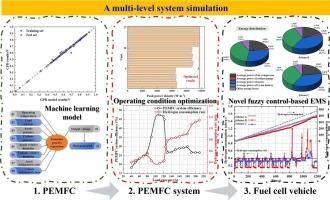A comprehensive system simulation from PEMFC stack to fuel cell vehicle
IF 11
1区 工程技术
Q1 ENERGY & FUELS
引用次数: 0
Abstract
The commercialization of fuel cell vehicles (FCVs) is a key method for achieving deep decarbonization in the transportation sector. Boosting powertrain energy conversion and utilization efficiency, especially for fuel cells, is crucial for advancing FCV technology. In the present study, a multi-level FCV system model is developed, and optimization has been carried out at various scales. The results reveal that the Gaussian process regression (GPR) model outperforms other machine learning models in performance prediction accuracy and speed. Then, based on the GPR model, different optimization algorithms are adopted to obtain the optimal operating conditions. Under the hydrogen recirculation architecture of this study, the system efficiency reaches its peak (47.4 %) at a load current of 110 A, which corresponds to the lowest point of hydrogen consumption. By coupling machine learning stack performance prediction models, the dynamic performance and fuel economy of FCVs under the New European Driving Cycle are studied. A novel fuzzy control-based energy management strategy (EMS) is proposed, which can significantly improve energy utilization efficiency while reducing the fuel cell power fluctuations. The multi-level optimization research conducted in this article, from the cell itself to the system and then to FCVs, can be widely applied to the design or control of FCVs' powertrain.

从PEMFC堆叠到燃料电池汽车的综合系统仿真
燃料电池汽车的商业化是实现交通运输领域深度脱碳的关键途径。提高动力系统的能量转换和利用效率,特别是燃料电池的能量转换和利用效率,对于推进燃料电池汽车技术至关重要。本研究建立了多级燃料电池汽车系统模型,并在不同尺度下进行了优化。结果表明,高斯过程回归(GPR)模型在性能预测精度和速度上优于其他机器学习模型。然后,在GPR模型的基础上,采用不同的优化算法,得到最优运行工况。在本研究的氢气循环架构下,系统效率在负载电流为110 a时达到峰值(47.4%),这对应于氢气消耗的最低点。通过耦合机器学习堆栈性能预测模型,研究了新欧洲循环工况下燃料电池汽车的动态性能和燃油经济性。提出了一种新的基于模糊控制的能量管理策略,在降低燃料电池功率波动的同时显著提高能源利用效率。本文所进行的多级优化研究,从电池本身到系统再到燃料电池汽车,可以广泛应用于燃料电池汽车动力总成的设计或控制。
本文章由计算机程序翻译,如有差异,请以英文原文为准。
求助全文
约1分钟内获得全文
求助全文
来源期刊

Applied Energy
工程技术-工程:化工
CiteScore
21.20
自引率
10.70%
发文量
1830
审稿时长
41 days
期刊介绍:
Applied Energy serves as a platform for sharing innovations, research, development, and demonstrations in energy conversion, conservation, and sustainable energy systems. The journal covers topics such as optimal energy resource use, environmental pollutant mitigation, and energy process analysis. It welcomes original papers, review articles, technical notes, and letters to the editor. Authors are encouraged to submit manuscripts that bridge the gap between research, development, and implementation. The journal addresses a wide spectrum of topics, including fossil and renewable energy technologies, energy economics, and environmental impacts. Applied Energy also explores modeling and forecasting, conservation strategies, and the social and economic implications of energy policies, including climate change mitigation. It is complemented by the open-access journal Advances in Applied Energy.
 求助内容:
求助内容: 应助结果提醒方式:
应助结果提醒方式:


